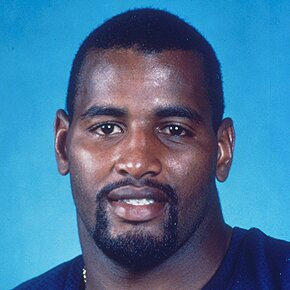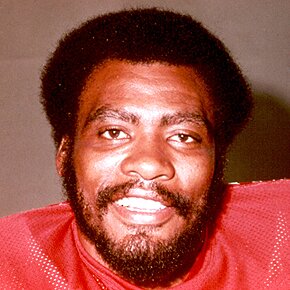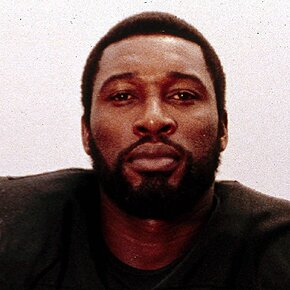4 HBCU Grid Stars Vie for Hall of Fame
|
Four former standouts from historically black colleges and universities are among the 25 semifinalists for the National Football League's Pro Football Hall of Fame for 2005.
All four are deserving of Hall of Fame recognition, but the selection process is a waiting game that can go on for years. "This is the second year I have made it this far," Dent, 44, said from Chicago, where in 2003 he was hired as an assistant defensive line coach for the Chicago Bears. "It's a nice feeling that your peers and writers put you in a certain category." A player, coach or contributor to the game can be nominated to the Hall's preliminary list by any fan writing a letter, as long as the nominee has been retired for five years. The selection process includes five levels of elimination, leading to the choice of three to seven inductees for the class of 2005. In October, the selection process for modern-era players began with 89 nominees, 14 of whom were alumni or former students of historically black colleges. Two names from football's early days were submitted separately. On Nov. 19, the current list of 25 nominees was announced. According to Joe Horrigan, vice president of communications for the Pro Football Hall of Fame, the list will be trimmed again in early January. "It's really difficult," said Horrigan. "Every one of the final 25 candidates has Hall of Fame credentials. It's a huge responsibility, and when I talk to the candidates, I tell them to be patient, because it's not if, but it's a matter of when." The nominee list was cut, and the final decision will be made, by a selection committee comprising 39 judges who are sportswriters from all over the country. "It doesn't matter where a player played college ball," said Cliff Christl, a sportswriter for the Milwaukee Journal Sentinel and member of the selection committee. "It's obvious that some of the greatest players came from predominantly black colleges. I think it takes a special player to make the Hall of Fame -- a special player depends on position longevity and how many times he goes to the Pro Bowl." Not everyone agrees that college legacy doesn't matter. "One fact is that the sportswriters who were writers on the Atlanta and Chicago beats when Dent and Humphrey played are no longer on the beats," said Joe Gilliam, former Tennessee State University head football coach. "They really don't know how those youngsters played. I think that's unfortunate. "If they (sportswriters) study the film, they will see," Gilliam said. Otherwise, "their votes are flawed . . . they are voting blind. If it were the University of Mississippi and the University of Georgia, they will go back and see how great these players were." Waiting for Hall of Fame recognition isn't easy: Having made it to the final preliminary list twice, Dent said he didn't like to wait for phone calls. He said he really wants to be selected, but he is not sitting around wishing the phone would ring. He owns several businesses: a phone company, a utility firm and an energy communication enterprise. "I am in the business of serving and that's what I like doing," Dent said. Dent was born in Atlanta on Dec. 13, 1960, and went to Tennessee State to play under legendary coach John A. Merritt. The 6'5", 265-pound defensive end then used his size and talent to propel himself into history books, becoming one of the most successful athletes ever at a historically black college. He earned collegiate letters for the 1979 to 1982 seasons. He was a member of Tennessee State's 1979, 1981 and 1982 Black College National Champion teams. Dent anchored a defense that lost only five games in his four years as a Tiger, and earned All-American honors in 1980 (Atlanta Daily World) and 1982 (Sheridan Poll). "I learned a lot at TSU," Dent said. "I came there full of hopes and dreams. I liked what I saw there and I liked the coaches. TSU without a doubt was very important to my professional career." Dent was drafted by the Chicago Bears in the eighth round of the 1983 NFL draft. He earned Most Valuable Player honors in Super Bowl XX (1986) with the Bears after recording 1.5 sacks (tackling a quarterback behind the line of scrimmage), and forcing two fumbles. Dent was an NFL Pro Bowler in 1984, 1985, 1990 and 1993 and was a member of two Super Bowl champion teams: the Bears in 1985 and the San Francisco 49ers in 1994. During the 1985 season, he led the NFL with 17 sacks. Currently, Dent is the all-time Chicago Bears sack leader, with 124.5 sacks. He finished his professional career with 137.5 sacks. He played briefly for the Indianapolis Colts and Philadelphia Eagles before he retired from the game in 1999. "It is a great honor that four players from HBCUs are among the 25 finalists," said Trey Ragland, a Tennessee State sophomore and computer science major from Rome, Ga. "These men have done an excellent job showing that if you work hard for something then you will be rewarded, no matter where you are from, and it's good to know the NFL acknowledges that." Claude Humphrey
That team finished 10-0 and won the Grantland Rice Bowl 34-7. That season, Humphrey helped anchor a defense that allowed only 5.1 points per game. A native of Memphis, Humphrey was a letterman from 1964 through 1967, and a member of Tennessee State's 1965 and 1966 Black College National Champion teams. Throughout his college years, he experienced defeat only five times and won 33 games. The defensive tackle earned All-American honors in 1966 and 1967 from the Pittsburgh Courier, Ebony Scoreboard, Sporting News, Time magazine and the Associated Press. Waymond Bryant remembers Humphrey's influence on him. "In high school, we had the opportunity to see TSU play Bishop College," said Bryant, a former Chicago Bear (1974-1978) and three-time All-American at Tennessee State. "That inspired me to be a part of a winning tradition and that was the first time I saw someone step over another man." Humphrey was drafted by the Atlanta Falcons in 1968, and went on to become the NFL's Defensive Rookie of the Year. He played defensive end for the Falcons from 1968 to 1974 and from 1976 to 1978. He later played for the Philadelphia Eagles, and was a member of the Eagles' 1980 Super Bowl team. He played five consecutive Pro Bowls from 1970 to 1974 and a total of six in his career. In 1999, Sports Illustrated named Humphrey one of Tennessee's 50 greatest sports figures of the 20th century. L.C. Greenwood
He helped win four Super Bowls, was named to every All-Pro team during the 1970s, and played in six Pro Bowls. Greenwood was born in Canton, Miss., in 1946. He had a stellar collegiate career at Arkansas AM&N College (now the University of Arkansas at Pine Bluff), where he graduated with a bachelor of science degree in vocational engineering. He was inducted into the Southwestern Athletic Conference's Hall of Fame on Dec. 10. Throughout his career, he earned a string of honors, including participation in the 25th Anniversary Super Bowl Team, the 100-Year Black College All-American Team and the 75th Silver Anniversary Super Bowl Team. He retired from football in 1981. According to news releases, he has most recently been a businessman and president of several companies, including a coal and natural-gas marketing firm; an electrical supply business; and one that manufactures and distributes packing products. About Greenwood's legacy, Maurice Forte, head coach at the University of Arkansas at Pine Bluff, said, "It helps tremendously when you have a person from an HBCU to play for Pittsburgh. It brings attention, and because of his success on the field and in business, it shows that we have a great program for athletics and education. Anytime you have a famous alumnus, you can recruit good students and student athletes." Harry Carson
He never missed a game during his four years as a defensive lineman. During his senior season alone, he had 30 sacks and 114 tackles. Carson earned many honors, including a place on the South Carolina All-State team. The Mid-Eastern Athletic Conference twice named him defensive player of the year. He also received honors for having the highest grade point average of the black college All-Americans of his time. Carson became a linebacker for the New York Giants, and played for the team from 1976 to 1988. He earned nine Pro Bowl appearances. He retired after the 1988 season. This October, he was named executive director of the Fritz Pollard Alliance, a group of black NFL personnel who mentor and develop young coaches. "Growing up, I always heard about Harry Carson," said Kelli Burke, a senior at Tennessee State University and business management major from Charleston, S.C. "I learned that he was not only a great athlete but also a great student. He was the perfect example of the student athlete and another great product of an HBCU." The Pro Football Hall of Fame selection committee plans to meet in February in Jacksonville, Fla., for the final vote to decide the 2005 inductees. The enshrinement is to take place in August at the Pro Football Hall of Fame in Canton, Ohio. Posted Jan. 2, 2005 Updating: 4 from HBCUs Among 15 Finalists (News release, Jan. 11) |
https://blackcollegewire.org/sports/041231_hall-of-fame/
|
Home | News | Sports | Culture | Voices | Images | Projects | About Us Copyright © 2007 Black College Wire. Black College Wire is a project of the Black College Communication Association and has partnerships with The National Association of Black Journalists and the Robert C. Maynard Institute for Journalism Education. |



